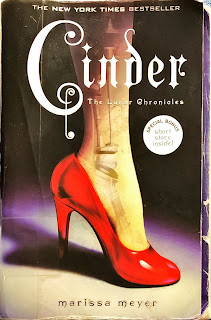Evaluation of the book:
The plot of Cinder by Marissa Meyer is, you guessed it, a retelling of the story of Cinderella. Ish. This book takes the familiar storyline of orphaned-servant-girl-turned-princess and gives it a science fiction and dystopian twist. Cinder the character is hated because she’s cyborg, part robot and, in the end, she becomes a princess not because she marries the prince (though their romance is as juicy as you’d want) but because she finds out she’s the niece of the moon queen and the moon’s rightful heir. Cinderella is a lot less predictable when you throw in the dystopian plague and hovercrafts.
Although the narration of this book is told in the third person, the point of view is uniquely Cinder’s (with a few glimpses into Prince Kai’s world). Because of Cinder’s perspective, we’re given a firsthand glimpse into what it’s like to be hated simply because you’re different. We see, through the POV, that Cinder is just a normal teenage girl and yet, for some reason, those around her hate her simply because she’s cyborg, part robot. This point of view helps us see the injustice of it all and to stand by Cinder as she makes each of her decisions.
Not only is this book science fiction in nature - cyborgs, hovercrafts, androids, oh my! - but it also has a dystopian setting. It’s set in a city called New Beijing in a country called the Commonwealth. The Earth has been divided into four allied ruling countries after the end of World War IV. People live on the moon because they fled that war. By setting her story in the real, though futuristic world, Meyer adds the finishing touch on our empathy for Cinder. She lives on earth, just as we live on earth. Even after we discover she’s from the moon, it’s too late for our loyalties to change. We see ourselves in Cinder.
Response:
How well does it address things that you, personally, care about and consider important to the world?
This book does a good job showing that hatred or fear of differences - cyborg or Lunar, in Cinder’s case- is wrong. As readers, we like Cinder, we empathize with her, and yet everyone around her hates what she is. We know that there is nothing hateful about her, but all her fellow countrymen can see is her differences. We feel this injustice just as Cinder feels it; hopefully we will take that feeling outside of our reading and make the world a better place by being more empathetic and inclusive.
Critique?
Cinder is a very fun book. It’s a clever take on the Cinderella story that is made more exciting by science fiction and dystopian elements. Despite its familiar storyline, the book’s plot is unpredictable and enjoyable due to new elements like space travel, moon-dwellers, cyborgs, and more. Overall, a very well-crafted novel.
What is your overall reaction to the text?
I wish this book existed when I was younger, it’s exactly the type of book I loved to read - fairy tales with a twist. Reading it now, as an adult, brought back that former love of fairy tales and made me want to re-read all of my favorites (and the rest of the Lunar Chronicles!).
Conclusion:
I recommend this book to any teenager who, like me, can’t get enough of fairy tale remixes. I’d also recommend this book to any science fiction or dystopia fans who want a fresh take from those genres. With its fairy tale, science fiction, and dystopian elements, this book is sure to please a wide variety of readers. Add in Cinder’s relatable plight and there’s no one who can (or should) resist this fun story.
APA Style Reference:
Meyer, M. (2012). Cinder: The Lunar chronicles. New York, NY: Feiwel and Friends.

No comments:
Post a Comment